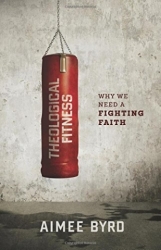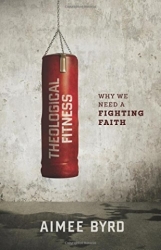We are very pleased to announce a new title by our own Housewife Theologian, Aimee Byrd. Aimee is the author of the Housewife Theologian: How the Gospel Interrupts the Ordinary (P&R, 2013) and a co-host on the popular Mortification of Spin. Her new Theological Fitness: Why We Need A Fighting Faith is a challenging work written in Aimee’s typical engaging style, and she’s here today to talk about her new book.
Books At a Glance:
Let’s start with your title – what do you mean by “Theological Fitness”? What is your new book about?
Byrd:
 In my book I make the case that perseverance in the Christian life requires a fighting faith. We are exhorted in the sermon-letter to the Hebrews to “Hold fast to the confession of our hope without wavering” (Hebrews 10:25) to persevere. One thing is for sure, we cannot hold fast to a confession of hope that we know little about. Faith is a gift of God, but faith is a fighting grace! Theological fitness, then, refers to that persistent fight to exercise our faith by actively engaging in the gospel truth revealed in God’s Word. It isn’t just a remembering of some Bible verses about God, but a trust in his promises that motivates us in holy living.
In my book I make the case that perseverance in the Christian life requires a fighting faith. We are exhorted in the sermon-letter to the Hebrews to “Hold fast to the confession of our hope without wavering” (Hebrews 10:25) to persevere. One thing is for sure, we cannot hold fast to a confession of hope that we know little about. Faith is a gift of God, but faith is a fighting grace! Theological fitness, then, refers to that persistent fight to exercise our faith by actively engaging in the gospel truth revealed in God’s Word. It isn’t just a remembering of some Bible verses about God, but a trust in his promises that motivates us in holy living.
Books At a Glance:
Explain for us how the context and implications of the command to “hold fast to our confession of hope” shape your approach in the book.
Byrd:
It’s easy to go at this exhortation as a personal command to persevere in the faith. However, it begins with two easily overlooked words: “Let us.” Hebrews is a sermon-letter written for a congregation. We hold fast to the confession of our hope in the covenant community of the church. I don’t want to rip Hebrews 10:23 out of context. In Hebrews we find a rich doctrine of the church, as well as many indicatives of the One who is faithful. So my book opens with two chapters on the church, and closes with two chapters on the faithfulness of Christ. I show how God has worked through his covenants to lead us to that eternal Sunday that we are striving to enter.
Books At a Glance:
How is perseverance connected to theological health?
Byrd:
Most of us care about physical health. We know that good health leads to a longer life. But do we think about the correlation between our theological health and our ability to faithfully persevere to the end of the Christian life? We all want to be healthy, right?
The problem is that there is something always working against us in our fight to be healthy, whether it is in a physical pursuit of fitness or in a vigorous effort to know God. John Owen explains that this command in Hebrews to hold fast insinuates an opposing force, a “great danger” even. “To ‘hold fast’ implies the putting forth our utmost strength and endeavors in the defense of our profession, and a constant perseverance in so doing” (John Owen, Epistle to the Hebrews [Grand Rapids: Kregel, 1968], 200).
Books At a Glance:
You spend a good bit of time teasing out the fitness metaphor – exercising, training, strengthening, and so on. Just what does it mean to “train” or “exercise” spiritually? How do we “exercise” in order to strengthen faith?
Byrd:
Since there are opposing forces that work against our fight to persevere, it should be clear to us then that we are not going to passively become mature Christians. I believe this is why Paul uses metaphors of military combat and running for the prize and the preacher to the Hebrews exhorts us using illustrations of a marathon and the Grecian Olympic games. The Christian life is littered with obstacles. Athletes train for these kinds of things. Have you ever known a professional athlete who trained alone or without a plan? As theologians of the cross, we are called to persevere through suffering and adversity. The Christian life requires fitness. You have to be prepared to deal with suffering! Endurance takes stamina. Stamina takes training. Faith is a fighting grace and we should never mistake it for an easy believism until “the roll is called up yonder.” If we want to strengthen our faith then we must put the work in to train.
Books At a Glance:
Explain for us your emphasis on the importance of focus. On what, specifically, should we focus? And how is this important in the Christian race?
Byrd:
The key to holding fast is focus. That is exactly the exhortation that the preacher to the Hebrews gives in his very first warning to persevere, “Therefore we must pay much closer attention to what we have heard, lest we drift away from it” (Heb. 2:1). He’s not just casually saying, “pay attention here guys.” No, this is a command to be superabundantly engaged in God’s Word, intensely involved. Isn’t that what holding fast really is? Hebrews has a forward-looking focus. The preacher keeps reminding the reader where Christ is now, seated at the right hand of the Father, interceding on our behalf. This is great news to hold on to when we are discouraged and weary in life.
And thankfully, we are given a helper. As the Holy Spirit opens our hearts to the promises of God, he also gives us a desire to learn from God’s Word and walk in it. But we still need to exhort one another not to just go through the motions. We need to encourage one another to pay attention to the gem that we have, give heed to God’s Word, and get engaged with its message of salvation.
Books At a Glance:
You make a point to emphasize the corporate dimension of the exhortation – “Let us hold fast to our confession.” In practical terms, just what does this corporate dimension of perseverance look like? What suggestions could you give to us with regard to our congregations?
Byrd:
Actually, on one hand it looks pretty ordinary. We live in a time where extraordinary means are used to convey pretty humdrum data, right? These fantastic devises that we have available to us, constantly notifying us of what we are missing out on, may actually lead us to believe that we are receiving extraordinary information. Conversely, God has ordained very ordinary means to convey extraordinary grace that we cannot get anywhere else. While our spectacular, shiny devices mediate our friends’ latest status updates to us, Jesus Christ and all his benefits are conferred to us through the preached Word and the sacraments. Hebrews tells us that Jesus is the Mediator of a better covenant that is established by better promises (8:6). We have direct access to God through Christ’s priestly service. Not only that, but in him Christ’s church makes up the living temple of God, “mediating God’s presence to the world,” as G. K. Beale puts it (G. K. Beale, “The Temple and the Church’s Mission” [lecture, Christ Reformed Church, Anaheim, CA, March 30, 2007], available online here..
The church is a living picture of extraordinary grace. We are a body full of helpless sinners, who have been rescued and redeemed and now embody the Spirit of our Savior himself!
On the other hand, I make the case that the church is really the “toughest event on the planet.” We appear a bit strange to the watching world. We will face many obstacles in the life of faith and so it is imperative to strive together as a church, even when it is uncomfortable and difficult— especially when it is uncomfortable and difficult. We invest in one another because of the one who invested in us. And we hold fast to our hope in the covenant community of the church. Part of knowing God (theology) is knowing his bride, the church.
Books At a Glance:
Tell us something about the background to this book – how did it come about? And who, primarily, is your intended audience?
Byrd:
I taught a weekly Bible study on Hebrews to a group of women for a year at my previous church. As were studying all the indicatives about how Jesus Christ is the ultimate prophet, priest, and king, I was captivated when we reached the imperative to persevere in Hebrews 10:23. We were getting quite a workout with all the theological teaching in Hebrews, and this theme to hold fast was building more and more as we continued to read. I felt like we had been climbing mountains and reached a peak with this exhortation. To persevere, we are told to hold fast to the confession of hope that this preacher has already faithfully delivered. It made me reflect on all the professing Christians that are not able to articulate the content of their faith well.
Another interesting background to my passion for theological fitness is the type of family I was raised in. My father taught martial arts out of our home and was a Secret Service Agent for a while, and my mom owned a gym. While most families may discuss current events, their day at the office, or maybe even do devotions at the dinner table; our normal conversations started off with something like how Randy trained so hard today in class that he puked. I was raised with a fighting mentality that associated well with the message in Hebrews. That’s when I made the connection to express our need for theological fitness in the Christian life.
This book is written for all of us who want to persevere in the faith to the new heavens and the new earth. What is your confession of hope? What do you cling to when you suffer rejection, depression, the death of a loved one, or just plain weariness in life? If you want to see how your knowledge of the Person and work of Christ will help you fight to endure, I encourage you to partake in a little theological fitness training.
Buy the books

THEOLOGICAL FITNESS: WHY WE NEED A FIGHTING FAITH
